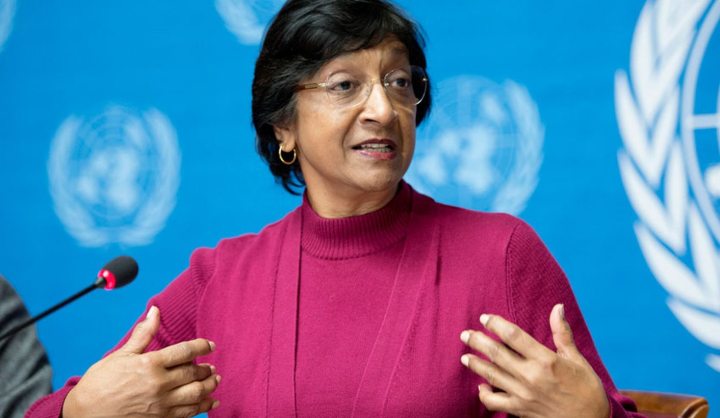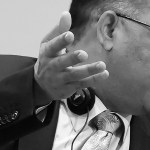World
No ‘one size fits all’ solution for intrepid international jurists on the world stage

International jurists are brave pioneers blazing an uncertain and precarious trail through a maze of political, financial and other daunting obstacles to bring the world’s worst criminals to justice. By PETER FABRICIUS.
This may sound more like the adventures of Indiana Jones than the solemn deliberations of learned justices in sombre robes and sometimes even wigs. But it was the plausible picture of international justice which emerged at a recent seminar held by Germany’s Wayamo Foundation and the American Bar Association in the appropriate venue of Arusha, Tanzania.
Arusha is to Africa what The Hague is to Europe and the world. It is where many of the worst perpetrators of the 1994 Rwanda genocide have been tried at the specially-created International Criminal Tribunal for Rwanda (ICTR) and where the African Court on Human and Peoples Rights and East African Court of Justice now sit.
The Wayamo Foundation is an independent, non-profit organisation established to strengthen the rule of law and promote international criminal justice.
The theme of the Arusha seminar was: “Judicial independence – a Foundation for combating International and Transnational Crimes.” It brought together an impressive bench of judges from Africa, the US and Europe to consider its verdict on this grave matter.
Though East Africa was generally well represented, Kenya, just across the border, was not at all. That told a significant story in itself. The scuttlebutt on that was that some Kenyan judges had been invited but had been forced to decline. Kenya’s critical elections were to be held the next day and apparently the Kenyan government forbade judges from travelling abroad in case that was interpreted as fleeing the country ahead of anticipated violence.
Ironically, those same elections were to present a perfect test case for the main theme of the Wayamo seminar – the critical importance to proper justice of an independent judiciary. As we now know the Kenyan Supreme Court delivered a courageous and unprecedented (in Africa) decision on 1 September to annul the election victory of the incumbent President Uhuru Kenyatta and to order a re-run of the poll.
Kenyatta’s response was to hurl invective at the judges, calling them crooks and stooges of white interests and to issue thinly-veiled threats against them. But he also accepted their verdict in the end.
And the overall implicit message of the Arusha seminar was also that justice – in this case international criminal justice and transnational justice – is by no means a given. It’s clearly a daily battle against daunting odds.
South Africa’s Navi Pillay, for example, described her pioneering days as one of the first judges of the Rwanda Tribunal in 1994. She heard the tribunal’s very first indictment of an accused in the same hotel where the seminar was taking place because the court building was not yet ready. But she felt it did not befit the solemnity of the occasion to sign the indictment in a hotel so she went to the construction site of the new court to sign it there.
Pillay recalled “the initial shock and dismay I felt in realising that a great responsibility lay on our shoulders, that a larger role was expected of us, to realise the ultimate goal of achieving peace and reconciliation in these war torn countries”.
She and her fellow judges were true judicial pioneers because individual accountability for gross violations of human rights and humanitarian law was just resurfacing at the ICTR and the companion International Criminal Tribunal for former Yugoslavia, (ICTY) for serious crimes committed in the disintegrating Balkans, after a half century hiatus since the Nuremberg war crimes trials of Nazis and the International Military Tribunal for the Far East for Japanese war crimes.
The grave crimes of genocide, war crimes and crimes against humanity which she was trying did not exist on the statutes of many countries. The concept of international criminal justice was still largely unknown, even in some surprising quarters. Pillay told how Anthony Kennedy – one of the nine US Supreme Court justices – had said to her back then; “You are not real judges, are you? Have you written any judgments?”
“And this was at a time when here in Arusha I was on a panel when we delivered the world’s first decision on genocide. There was no precedent.
“We delivered here the world’s first conviction of sexual violence as constituting genocide and crimes against humanity.”
Pillay and her fellow judges created the crime of sexual violence as genocide by asking probing questions of Tutsi women witnesses, even though their tormentors had not been charged with that specific crime.
“So the world’s first judgment on sexual violence (as genocide) would not have come about if we judges hadn’t intervened and asked the questions.”
US Supreme Court Justice Sonia Sotomayor told how that court had been lambasted by dissenting judges when it took into account the international sentiment in overturning capital punishment for juveniles.
Pillay related how she had visited Rwandan President Paul Kagame and threatened to release all the court’s prisoners, if he did not allow witnesses to participate in the Tribunal. She at first resisted tackling Kagame because she said that was not her role as a judge. But she realised that if she didn’t, no-one would.
Playing politics happens at all levels of the judiciary, as Justice Ibrahim Juma, acting chief justice of Tanzania, made very clear.
Judges were “not supposed to be politicians” but nonetheless had to read which way the political wind was blowing to keep their jobs – and so preserve judicial independence.
“If we don’t keep our ears open and adjust, someone is going to adjust us. If we delay some one might think of enacting a law to take away our independence.”
Bertram Schmitt, an International Criminal Court judge, told the Wayamo seminar the challenge to judicial independence was even greater at the international level, including the ICC, than at national courts because the political stakes were higher. The ICC adjudicated “the most serious crimes of concern to the international community as a whole” as the Rome Statute put it.
The crimes were also typically committed on a large scale, and even more significantly were often state-sponsored and originated in armed conflicts with high political stakes. The criminal conduct of individuals was often embedded in controversial and complex political situations and suspects could be cabinet ministers or even state presidents.
The political aspect of the ICC was most obvious when situations were referred to it by the UN Security Council as these referrals were normally the result of protracted political discussions.
Nonetheless he insisted that this did not mean the ensuing trials were politically biased because the Security Council could only refer “situations”, while it was up to the ICC Prosecutor and courts to decide which individuals to prosecute.
Such Security Council referrals to the ICC are widely criticised because three of the five permanent, veto-wielding members of the Council – the US, China and Russia – are not members of the ICC.
Schmitt put a positive spin on that, saying this allowed the ICC to effectively ignore these three powers. Conversely, African states had a significant presence as four judges, the chief prosecutor, the president of the Assembly of States Parties (which supervises the ICC) and 23% of the court’s staff were African.
The African Union has ordered its members not to cooperate with the ICC largely because of its indictments of Bashir and Kenyatta. Schmitt urged African states instead to use their large influence on the court to make necessary improvements.
He acknowledged, for instance, that the Security Council could still exert undue political influence by its power to defer investigations and prosecutions indefinitely. This was supposed to be to avoid indictments interfering with peace efforts. But the power could be abused.
Stephen Rapp, a former prosecutor at the ICTR and at the Special Court for Sierra Leone which tried perpetrators of the terrible violence there in the late 1990s, said there was always a strong preference for criminal cases to be head in national courts which had the constitutional authority to do so.
But Rapp, now at the Hague Institute for Global Justice, said that many cases had to be heard instead by international courts because it was impossible for national courts to do so. This might be because perpetrators of atrocities still wielded power, so they would lack the political will for an independent trial. Conversely there might have been a change of power and the new regime “have a fantastic amount of political will. They want to hang all the people in the previous government – and may not want to give them rights at all”.
Or the national courts might not have the capacity to try these worst crimes because the instruments of state had largely been destroyed, and many of the judges, lawyers and prosecutors, dead or fled.
Or there was a lack of legal tools. The crimes, like genocide, might not be on the national statutes. Many of these problems existed in post-war Germany which led to the international Nuremberg trials.
But as the Nuremburg trials progressed to 1949, the Germans eventually picked up the reins themselves. They used the evidence gathered at Nuremburg in the 1960s and later to prosecute SS commanders and guards of the Auschwitz-Birkenau death camps in the Frankfurt courts. Wayomo Foundation director Bettina Ambach’s father used that evidence also to prosecute SS officials who had served in the Majdanek death camp.
The ICTY had similarly became necessary because obviously Serb leader Slobodan Milosevic wasn’t going to turn himself in. “And many of the people who committed crimes in Serbia, Bosnia and Croatia were regarded as heroes in their own group. It would have been impossible to prosecute those cases.”
Rwanda was a little different because originally the Security Council didn’t think the security situation there was good enough for a trial. Also many top suspects had fled Rwanda to countries like Cameroon and Tanzania which wouldn’t extradite them to Rwanda.
“And so by having an international court, we were able to bring those individuals from 26 different countries to Arusha here and have those trials to international standards.” Now both Serbia and Rwanda were prosecuting cases which the tribunals – that are now being run down- used to.
And this tendency seems to be gaining ground, Rapp suggested. Columbia, for example, did not want the ICC to prosecute the cases emerging from its long civil war with the FARC group that is now ending.
“So that creates an incentive for them to negotiate a transitional justice arrangement which does hold people to account.”
Rapp cited the Special Court for Sierra Leone which he had served on, as example of a hybrid court which strengthened local judicial capacity but also addressed the lack of will to prosecute some of those who fought on the government side.
The hybrid court introduced international judges to address that problem.
The trial of the former Chadian dictator Hissen Habre for atrocities committed in the 1980s also used a hybrid arrangement to address the lack of legal instruments to try him.
He had sought refuge in Senegal which passed a law to allow it to try crimes in another country, Chad. This was challenged in national courts and overcome. But then the Ecowas regional court overruled that, saying Senegal could not try a retroactive case as under the African charter you would have to have the law in effect beforehand.
But an international court could apply international law retrospectively and so Senegal and the African Union created the Extraordinary Chambers, a hybrid court, which got around the retrospectivity problem by using some international judges.
This was an example of how the legal, judicial communities had to work together- creatively he might have added -to overcome the particular challenges, such as a lack of political will, that they confronted in combating impunity for crimes “that threaten us all”- not only the ICC-type international crimes such as genocide, war crimes, crimes against humanity and aggression, but also transnational crimes, such as human, drug and wildlife trafficking and corruption.
Rapp was encouraged by the fact that Gambia had reversed its decision to withdraw from the ICC, that the South African High Court had blocked South Africa’s effort to do so and that Burundi’s determination to withdraw would not stop the ICC from pursuing crimes there.
Another instrument that those seeking international justice could resort to was that of universal jurisdiction, Rapp proposed. He many were criticising the ICC for not opening a case in Syria. But Syria was not a member of the ICC. The UN Security Council had instead tried to refer Syria but Russia and China had blocked this move .
Third countries could potentially prosecute though, under the principle of universal jurisdiction, if some of the perpetrators or many witnesses come to those countries. This was already happening in Europe. And the Habre case was an example in Africa. South Africa, he noted, also had this power, as it had shown when the courts had directed the police to investigate torture by senior Zanu PF officials against MDC opposition members in Zimbabwe, because the alleged torturers were visiting South Africa.
And there was hope even in Syria, he suggested, as the UN General Assembly had created, by a vote of 105 to 15 last December a new mechanism to gather evidence of war crimes and crimes against humanity in the current civil war in Syria.
That would help in any future prosecution of the perpetrators if some sort of war crimes tribunal could be established in the future, Rapp said.
And so those seeking to end impunity for the worst crimes have to be courageous, imaginative, determined, resourceful and street-wise. That was clearly one of the main lessons to be learned from the Arusha seminar.
“The variety of situations which international justice has to respond to are infinite,” said Olufemi Elias, assistant secretary-general and registrar of the UN Mechanism for International Criminal Tribunals, which is completing the unfinished business of both the ICTR and the ICTY.
“And there are a number of tools which exist in the international system, and how it relates to national systems, as to how these can be approached. What fits one particular situation will not fit the next. The diversity of options is something that needs to be taken advantage of.” DM
Photo: Judge Navi Pillay speaking at a press conference in Geneva in December 2013. UN Photo/Jean-Marc Ferré



















